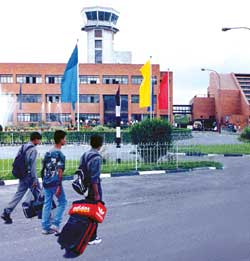 Tourism and exports are near-collapse, and yet the economy is still afloat. How come? Nepalis working abroad are now sending back a whopping $850 million a year. Forget foreign aid and exports, forget tourism. It is overseas remittances that are propping up Nepal's economy.
Tourism and exports are near-collapse, and yet the economy is still afloat. How come? Nepalis working abroad are now sending back a whopping $850 million a year. Forget foreign aid and exports, forget tourism. It is overseas remittances that are propping up Nepal's economy. The Nepal Rastra Bank's official figure for remittances in the past fiscal year is Rs 22 billion, but a whole lot more-as much as three times-comes into Nepal through the informal hundi system and feeds a vast parallel economy that the government seems to have no way of monitoring.
Both official and unofficial estimates of overseas remittances have doubled in the past four years. In 1997, British researcher David Seddon and his Nepali colleagues Ganesh Gurung and Jagannath Adhikari estimated that Nepal receives as much as Rs 30 billion from Nepali workers abroad. But two years ago, a Himal Khabarpatrika estimate which included informal remittances from Nepalis working in India, put the total at Rs 69 billion. Some later estimates are even higher.
Officially, there are only about 180,000 Nepalis working in south-east Asia, the Gulf countries and South Korea. But the real number is probably double that-and this is not counting the million or so seasonal Nepali workers in India at any given time.
All the Labour and Employment Promotion Department, which is supposed to monitor the foreign employment sector, does, is tally the number of people processed by manpower agencies and come out with an annual total.
Other Third World countries export minerals and ore. Nepal has a long history of exporting human beings. Today, Nepalis are going further afield, and into non-traditional jobs as opportunities expand for overseas employment-they are employed as security guards on casino ships in the South China Sea, as guards on oil rigs in Angola, and as hotel managers in China. When Shiva Bahadur Thapa retired from the British Army, he didn't fancy starting a new career or staying idle. So, he got a job in the merchant marine. Shiva's colleagues from the army are security guards on tankers and container ships, thanks to a spurt in pirate attacks in the narrow Mallacca Straits. Another foreign worker we spoke to, Sampanna, says when he failed to make it to the final selection of Nepal's national tae kwon do team in 1999, he headed off to Germany where he uses his skills as a martial arts guru.
Back home, Nepal's tourism is down 50 percent, and the garment, carpet and pashmina industries have laid off an estimated 200,000 workers. More than half the garment workers in Nepal, according to a 1998 study, are in the 20-25 age group and most support families with more than six members. Now without jobs, many will be forced to seek work in the Gulf or Malaysia. With unemployment soaring in virtually every sector, the number of Nepalis migrating abroad to work will only go up.
The government has made it easier for Nepalis to work abroad, but the country still isn't maximising the benefits from its labour export. Many Nepalis are duped and exploited by manpower agencies, who take away a large chunk of the workers' earnings in illegal deposits or commissions, often up to three times the actual cost of a job. A study in Lahachok in Kaski district showed that nearly half the people in the village couldn't afford to pay even the minimum Rs 50,000 needed to get a job abroad. The government could stand guarantee to commercial banks for collateral-free loans to foreign job aspirants, just as it could help upgrade the skills of migrant workers from the low-paying manual labour they mostly do now, so they can earn more.
Although promoting foreign employment opportunities is a major component of Nepal's economic diplomacy, the government has failed to act on its own promises. A government delegation led by Labour Minster Palden Gurung last week brought home rosy assurances about providing at least 200,000 secure and safe jobs for Nepalis in Malaysia, but he failed to clinch a formal agreement.
"Unless foreign employment is regulated, the poorest sections of society will not benefit from it," says Ganesh Gurung of the Nepal Institute of Development Studies, who has been researching labour migration patterns in Nepal. Most experts agree that overseas employment exacerbates the urban-rural gap, because migrant workers invest their earnings mainly in the towns. Working abroad can only be a stop-gap arrangement until employment opportunities are created locally in rural areas. Says David Seddon: "What is needed is strategic and selective investment to keep workers in Nepal and in the smaller towns in the rural non-farm economy." He adds that the absence of young men means labour shortages, and possibly the decline of agriculture and the rural economy. The chief economic adviser at the Nepal Rastra Bank, Yub Raj Khatiwada, agrees. He told us: "Exporting workers can only be crisis management, not a long-term solution for the national economy."


